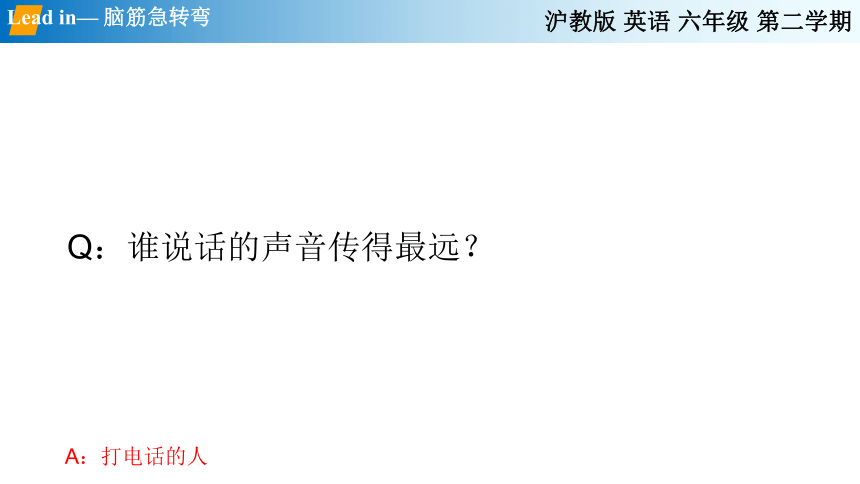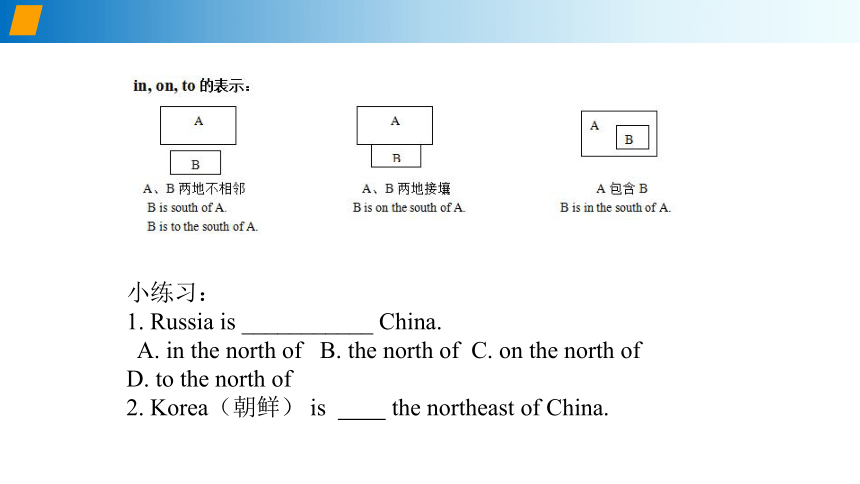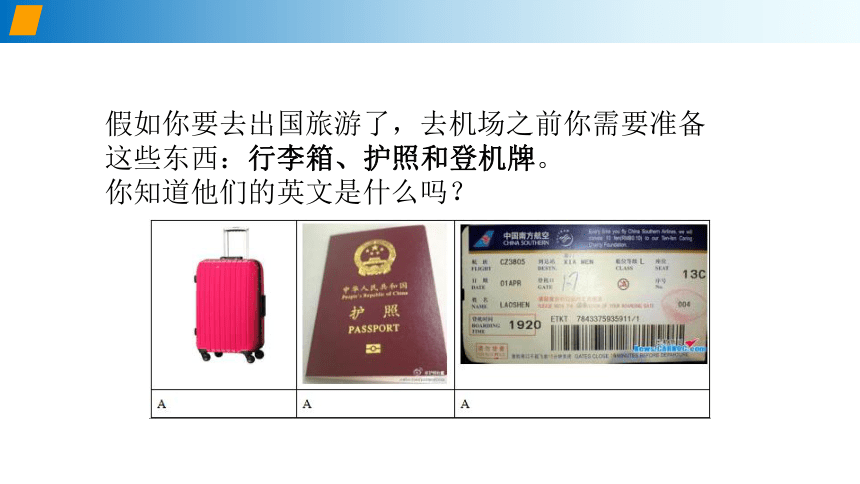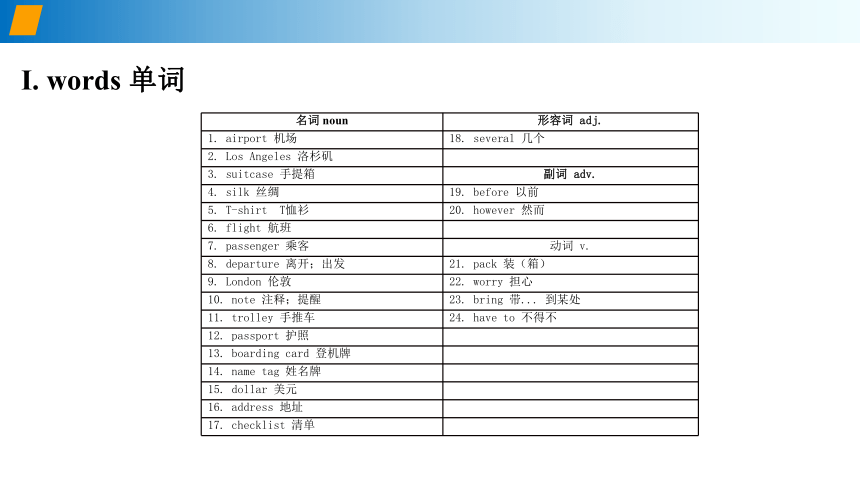Unit 2 At the airport 第1课时 基础知识及拓展(课件)-2021-2022学年六年级英语下册同步备课系列(牛津上海版)
文档属性
| 名称 | Unit 2 At the airport 第1课时 基础知识及拓展(课件)-2021-2022学年六年级英语下册同步备课系列(牛津上海版) |

|
|
| 格式 | pptx | ||
| 文件大小 | 504.3KB | ||
| 资源类型 | 试卷 | ||
| 版本资源 | 牛津上海版(试用本) | ||
| 科目 | 英语 | ||
| 更新时间 | 2022-02-17 00:00:00 | ||
图片预览












文档简介
(共46张PPT)
Lead in— 脑筋急转弯
Q:谁说话的声音传得最远?
A:打电话的人
沪教版 英语 六年级 第二学期
Snow and Ice Knowledge 冰雪知识
Skeleton钢架雪车
沪教版 英语 六年级 第二学期
网友因其英文名称还调侃:“雪道的尽头是骨科”。
闫文港
2022北京冬奥会铜牌获得者
一、课前回顾
小练习:
1. Russia is ___________ China.
A. in the north of B. the north of C. on the north of D. to the north of
2. Korea(朝鲜) is the northeast of China.
二、新课导入
假如你要去出国旅游了,去机场之前你需要准备这些东西:行李箱、护照和登机牌。
你知道他们的英文是什么吗?
三、新课讲解
Ⅰ. words 单词
名词 noun 形容词 adj.
1. airport 机场 18. several 几个
2. Los Angeles 洛杉矶
3. suitcase 手提箱 副词 adv.
4. silk 丝绸 19. before 以前
5. T-shirt T恤衫 20. however 然而
6. flight 航班
7. passenger 乘客 动词 v.
8. departure 离开;出发 21. pack 装(箱)
9. London 伦敦 22. worry 担心
10. note 注释;提醒 23. bring 带... 到某处
11. trolley 手推车 24. have to 不得不
12. passport 护照
13. boarding card 登机牌
14. name tag 姓名牌
15. dollar 美元
16. address 地址
17. checklist 清单
1. airport n.机场
e. g.-Our father is coming to Shanghai by air.我们的父亲要乘飞机来上海。
-I'll meet him at the airport.我会去机场接他。
2. Los Angeles n.(美国城市名)洛杉矶
e. g. Los Angeles has a population of 3,485,398.洛杉矶的人口是34853980。
3. before adv.以前
e. g.-Have you been to Shanghai before 你以前去过上海吗?
-No, this is my first time.没有,这是第一次。
【知识拓展】before prep. 在……前面
e. g. In the alphabet, A is before all the other letters.在字母表中,A排在所有字母前面。
4. T-shirt n. T-恤衫
e. g.-These T-shirts are lovely.这些T恤衫真好看!
-Yes, I'll buy one.是啊,我要买一件。
5. several adj.几个;一些
e. g. There are several apples on the table.桌子上有几个苹果。
-You seem to know each other well.你们好像很熟。
-Yes. We've met several times.是的,我们见过几次了。
6. however adv.然而;不过;仍然
e. g. She felt ill, however, she went to work.她病了,然而她照旧去上班。
Later, however, he decided to go.后来,他仍然决定去了。
7. pack v.装(箱);打(包)
e. g. Don't forget to pack your toothbrush.别忘了打包你的牙刷!
All these books need to be packed into boxes.这些书都要打包(装箱)。
【知识拓展】pack n.包;捆
e. g. a pack of cigarettes一包香烟
a pack of clothes 一包衣服
8. flight n.航班;班机
e. g. All flights have been cancelled because of fog.因为有雾所有航班都已取消。
We travelled aboard the same flight.我们搭乘同一班机。
9. passenger n.乘客;旅客
e. g. Two passengers in the bus were killed in the crash.汽车事故中两位乘客丧生了。
There were twenty passengers in the bus.公共汽车上有20名乘客。
This is a passenger train, not a goods train.这是客车,不是货车。
10. departure n.离开;出发
e. g. departure time出发时间
Mary, can you arrive at the railway station one hour before the departure time
玛丽,你能在列车出发前一小时到达火车站吗?
【知识拓展】depart v.离开,起程
e. g. We departed for London at 10 a.m.我们上午10点动身去伦敦。
11. worry v.担心
e. g. -Jane hasn't come home yet.简还没回家。
-Don't worry. She'll be back soon.别担心,她很快就回来了。
【知识拓展】worried adj.焦虑的
e. g. -The old man looks worried.那个老人看起来很着急。
-Let's ask if he needs help.咱们去问问他是否需要帮助。
12. London n.伦敦
e. g. -London is the capital of the United Kingdom.伦敦是英国的首都。
-How many people live in London 伦敦有多少人居住?
-About seven million.大约700万。
【百科小贴士】伦敦建都于11世纪,至今已经有九百多年的历史。伦敦位于泰晤士河下游两岸。大英博物馆、伦敦塔、白金汉宫、大本钟均为著名的旅游景点。
13. note n.注释;提醒;注意事项
e. g. On the board beside the river there is a note: Don't swim in the river. It is dangerous!
河边的木板上有句提示语:不要在河里游泳。危险!
They are reading an edition of Shakespeare with student's notes.
他们正在阅读一套附有学生注解的莎士比亚作品集。
【知识拓展】note n. 笔记
e. g. -Should we take notes in class 我们上课时要记笔记吗?
-Sure. They are useful for our study.当然,笔记对学习很有帮助。
14. trolley n.手推车
e. g. Get a trolley and it'll be helpful in the supermarket.弄辆手推车来,在超市里,它很有用。
15. passport n. 护照;通行证
e. g. You must show your passport to the inspector while you're leaving the Customs. 你出关时要向警官出示护照。
【记忆链接】school passport学校登记卡 service passport公务护照 ship's passport船舶护照
16. bring v.带……到某处;带来;拿来
e. g. Please bring your new textbooks to school tomorrow.明天请带新课本到学校。
【指点迷津】take,bring,fetch的区别
(1) take意为“把(物)拿去;带走;把(人)带去”。表示将人或物“拿开;带离”自己(说话者)所在位置的动作。
e. g. Take these plates away to the kitchen.把这些盘子拿到厨房去。
(2) bring表示将人或物“带到(拿到)”自己(说话者)所在位置的动作。
e. g. Don't forget to bring your dictionary with you tomorrow. 你(你们)明天不要忘带字典。
(3)fetch则表示“去拿(某物)来”的动作。
e. g. Will you fetch some water 你能去拿点水来吗?
17. dollar n.元(美国、加拿大等国家的货币单位)
e. g. -How much is the doll 这个洋娃娃多少钱?
-Five dollars. 5元。
【常用搭配】US dollar美元 Hong Kong dollar港币
18. address n.地址
e. g. -What's your home address 你的家庭住址是什么?
-My home address is 12 Nanjing Road.我的家庭住址是南京路12号。
19. checklist n.清单;核对表
e. g. You'd better make a checklist for your trip, or you'll forget something.
你最好列个旅行清单,否则你会忘掉某些东西的。
Daily expressions. 日常表达
1. plan to do… 计划做…
e. g. Tom is planning to visit Rome this Spring Festival.汤姆正计划今年春节到罗马旅行。
2. plenty of 许多,大量
后面可跟不可数名词,也可跟可数名词。
e. g. plenty of money大量的金钱 plenty of books大量的书
3. too many 太多
用于表示“超过,过量的”,后跟可数名词复数形式。
e. g. Eating too many sweets is bad for your teeth. 吃太多糖对你的牙齿不好。
【友情提示】too much也表示“超过,过量的”,但后跟不可数名词。
e. g. I just need a little sugar, not too much. 我只需一点点糖,不要太多。
【知识拓展】模糊数量的表达
英语中有许多模糊的数量词修饰不同的名词。
既能修饰可数名词又能修饰不可数名词的有:some, any, a lot of, lots of, plenty of, etc;
修饰可数名词的有:many, few, a few, a large number of, a great number of, etc;
修饰不可数名词的有:much, little, a little, an amount of, huge amounts of, a great deal of, etc。
4. leave for… 出发去……
e. g. When will you leave for Los Angeles 你什么时候动身去洛杉矶?
比较:leave Los Angeles离开洛杉矶 leave for Los Angeles出发去洛杉矶
5. have to 不得不
e. g. I have to send e-mails and answer phones at the same time.我只得一边发电子邮件,一边接电话。
6. a boarding card登机牌
e. g. Please have your boarding cards ready for inspection.请拿出登机牌,方便我们检查。
【友情提示】a boarding card又称a boarding pass, 且后者更为常用。
7. a name tag名字标签
【友情提示】name tag 一般被绑在所要托运的行李上,以避免领取行李时弄错。
随堂小练一
What does each sign mean.
1. We usually go up and down by .
2. There are many famous in Bangkok.
3. People can get some there.
4. We can take an in the shopping mall.
5. There are two in each building in my neighourhood.
6. It's easy for us to get a in the supermarket.
【Keys】1. lift 2. restaurants 3. information 4. escalator 5.exits 6. trolley
Important Sentences structures
1. Mrs Wang and Grandma have not been to the USA before.
【指点迷津】have/has been to, have/has gone to, have/has been in/at的区别
(1)“have/has gone to+地点”表示某人去了某地,现在没有回来,可能在去的途中,或已经到了目的地。
e. g. He has gone to Shanghai.他去了上海。
He has gone to Dalian. 他去了大连。
(2)“have/has been to+地点”表示某人去过某地,此时人已回到说话处,常与twice(两次),several times(几次),ever(曾经)或never(从未)等词组或副词搭配。
e. g. The old American man has been to China three times.这位美国老人到过中国三次。
Where have you been 你去过哪儿?
(3)“have/has been at/in+地点”表示在某地待了多久,后面须用表示一段时间的状语。
e. g. He has been at the village for ten years.他在村子里住了10年了。
How long have you been in Paris 你在巴黎住了多久?
如果have/has been后接的是地点副词here、there时,不用介词at或in。
e. g. We have been here for about two hours.我们在这里约两个小时了。
2. They have already done a lot of things.
However, they have not packed their suitcases yet.
(1) already通常用于肯定句中,表示“已经”。
e. g. I have already seen the film. 我已经看过这部电影了。
【友情提示】already一般不用于否定句中,但可用于疑问句中,表示期望得到对方明确的答复或表示一种惊讶,不过此时already常置于句末。
e. g. Have you read the book already 你已经看过这本书了吗?
(2) yet是副词,意为“已经”,用于否定句和疑问句中,在句中通常是位于句末。
e. g. I haven't finished my homework yet.我还没有完成我的家庭作业。
【友情提示】yet与not连用,(not yet)可用于作简略回答,意为,“还没有”。
e. g. -Have you ever read the book Red Star Over China 你曾读过《西行漫记》这本书吗?
-No, not yet.不,还没有。
【知识拓展】ever用于现在完成时,表示到现在为止的任何时候,意为“曾经”,多用于疑问句或表示最高级的从句中。
e. g. He is the best teacher that I have ever seen. 他是我迄今为止见过的最好的老师。
在否定句中,常用never(意为“从来不……;从来没有……”)代替not ever。
e. g. I have never visited Hangzhou. 我从未游览过杭州。
3. We should arrive at the airport before one o'clock.
【指点迷津】arrive,get,reach的区别
三者都可作“到达”解。
(1) arrive是不及物动词,后接名词或代词时要加介词in或at,arrive in指的是大地点;arrive at指的是小地点。
e. g. When will Jim arrive in Shanghai 吉姆将在什么时候到达上海?
We arrived at the station in hot haste.我们急急忙忙赶到车站。
(2) get为不及物动词,后接名词或代词时要加介词to。
e. g. When do you usually get to school 你通常什么时候到校?
We got to London at 7 o’clock.我们7点到达伦敦。
(3) reach是及物动词,后面可直接跟表示地点的名词或代词。
e. g. We are going to reach Beijing tomorrow morning.我们将在明天早晨到达北京。
Please phone me when you reach school.到校后给我打电话。
4. Aunt Judy and Uncle Mike have lived in Los Angeles for six years.
for后面常接一个指时间长度的词或词组表示一段时间。
【知识拓展】since后面也可以接表示过去时间的词或词组,也可以引导一个过去时间的从句,表达的是自从过去某一时间直到现在的一段时间。这时since表示时间段与for后面接一段时间所起的作用是一样的,二者经过变化以后,常可以互换使用。
e. g. The Greens have lived in China for two years.
=The Greens have lived in China since two years ago.格林一家在中国住了两年了。
We've known each other since ten years ago.
=We've known each other for ten years.自从十年前,我们就认识了。
5. We'll have to stay there for two hours.
have to意为“不得不”,用于表示一种必要,后接动词原形。
【指点迷津】must,have to的区别
must与have to都可意为“必须;应该;不得不”,其区别为:
(1) must表示说话人的主观看法,即主观上的必要性,没有时态、人称变化。
e. g. You must work hard at your lessons.你们应该努力学习功课。
I must go home.我必须回家。
(2) have to一般表示客观方面的需要,有时态和人称的变化。
e. g. I have to go there.我得去那儿。
We had to stay at home yesterday.昨天我们不得不待在家里。
(3) must的否定式为mustn't,表示“不应该;禁止;不允许”。
e. g. You mustn't play football on the street.不要在马路上踢足球。
(4)have to的否定式为do not have to,英国英语中常用need not来代替don't have to,表示“不必要”,
e. g. You do not have to come every day.=You needn't come every day. 你不必天天来。
Fill in the blanks with the given words in their proper forms.
1. I have bought two for my friends as Christmas presents. (scarf)
2. Would you please tell me the time of flight NO. MU586 . (depart)
3. I'll meet my father at the airport before the plane . (arrival)
4. There are some over there. (trolley)
5. All the must wait here until the rain stops. (passage)
6. Do you know the of the bus (destinate)
Rewrite the following sentences.
1. Jack's already been to Hainan Island. (改为否定句)
Jack been to Hainan Island .
2. This book cost him ten yuan. (保持句意不变)
He ten yuan this book.
3. They came back at two o'clock. (对划线部分提问)
____________ ___________ they come back
4. We should get to school on time every day. (保持句意不变)
We should____________ ___________ school on time every day.
【Keys】1. scarves 2. departure 3. arrives 4. trolleys 5. passengers 6. destination
【Keys】1. hasn't, yet 2. paid. . .for / spent. . on 3. When did 4. arrive at
愿君皆有所获,皆有所得
Lead in— 脑筋急转弯
Q:谁说话的声音传得最远?
A:打电话的人
沪教版 英语 六年级 第二学期
Snow and Ice Knowledge 冰雪知识
Skeleton钢架雪车
沪教版 英语 六年级 第二学期
网友因其英文名称还调侃:“雪道的尽头是骨科”。
闫文港
2022北京冬奥会铜牌获得者
一、课前回顾
小练习:
1. Russia is ___________ China.
A. in the north of B. the north of C. on the north of D. to the north of
2. Korea(朝鲜) is the northeast of China.
二、新课导入
假如你要去出国旅游了,去机场之前你需要准备这些东西:行李箱、护照和登机牌。
你知道他们的英文是什么吗?
三、新课讲解
Ⅰ. words 单词
名词 noun 形容词 adj.
1. airport 机场 18. several 几个
2. Los Angeles 洛杉矶
3. suitcase 手提箱 副词 adv.
4. silk 丝绸 19. before 以前
5. T-shirt T恤衫 20. however 然而
6. flight 航班
7. passenger 乘客 动词 v.
8. departure 离开;出发 21. pack 装(箱)
9. London 伦敦 22. worry 担心
10. note 注释;提醒 23. bring 带... 到某处
11. trolley 手推车 24. have to 不得不
12. passport 护照
13. boarding card 登机牌
14. name tag 姓名牌
15. dollar 美元
16. address 地址
17. checklist 清单
1. airport n.机场
e. g.-Our father is coming to Shanghai by air.我们的父亲要乘飞机来上海。
-I'll meet him at the airport.我会去机场接他。
2. Los Angeles n.(美国城市名)洛杉矶
e. g. Los Angeles has a population of 3,485,398.洛杉矶的人口是34853980。
3. before adv.以前
e. g.-Have you been to Shanghai before 你以前去过上海吗?
-No, this is my first time.没有,这是第一次。
【知识拓展】before prep. 在……前面
e. g. In the alphabet, A is before all the other letters.在字母表中,A排在所有字母前面。
4. T-shirt n. T-恤衫
e. g.-These T-shirts are lovely.这些T恤衫真好看!
-Yes, I'll buy one.是啊,我要买一件。
5. several adj.几个;一些
e. g. There are several apples on the table.桌子上有几个苹果。
-You seem to know each other well.你们好像很熟。
-Yes. We've met several times.是的,我们见过几次了。
6. however adv.然而;不过;仍然
e. g. She felt ill, however, she went to work.她病了,然而她照旧去上班。
Later, however, he decided to go.后来,他仍然决定去了。
7. pack v.装(箱);打(包)
e. g. Don't forget to pack your toothbrush.别忘了打包你的牙刷!
All these books need to be packed into boxes.这些书都要打包(装箱)。
【知识拓展】pack n.包;捆
e. g. a pack of cigarettes一包香烟
a pack of clothes 一包衣服
8. flight n.航班;班机
e. g. All flights have been cancelled because of fog.因为有雾所有航班都已取消。
We travelled aboard the same flight.我们搭乘同一班机。
9. passenger n.乘客;旅客
e. g. Two passengers in the bus were killed in the crash.汽车事故中两位乘客丧生了。
There were twenty passengers in the bus.公共汽车上有20名乘客。
This is a passenger train, not a goods train.这是客车,不是货车。
10. departure n.离开;出发
e. g. departure time出发时间
Mary, can you arrive at the railway station one hour before the departure time
玛丽,你能在列车出发前一小时到达火车站吗?
【知识拓展】depart v.离开,起程
e. g. We departed for London at 10 a.m.我们上午10点动身去伦敦。
11. worry v.担心
e. g. -Jane hasn't come home yet.简还没回家。
-Don't worry. She'll be back soon.别担心,她很快就回来了。
【知识拓展】worried adj.焦虑的
e. g. -The old man looks worried.那个老人看起来很着急。
-Let's ask if he needs help.咱们去问问他是否需要帮助。
12. London n.伦敦
e. g. -London is the capital of the United Kingdom.伦敦是英国的首都。
-How many people live in London 伦敦有多少人居住?
-About seven million.大约700万。
【百科小贴士】伦敦建都于11世纪,至今已经有九百多年的历史。伦敦位于泰晤士河下游两岸。大英博物馆、伦敦塔、白金汉宫、大本钟均为著名的旅游景点。
13. note n.注释;提醒;注意事项
e. g. On the board beside the river there is a note: Don't swim in the river. It is dangerous!
河边的木板上有句提示语:不要在河里游泳。危险!
They are reading an edition of Shakespeare with student's notes.
他们正在阅读一套附有学生注解的莎士比亚作品集。
【知识拓展】note n. 笔记
e. g. -Should we take notes in class 我们上课时要记笔记吗?
-Sure. They are useful for our study.当然,笔记对学习很有帮助。
14. trolley n.手推车
e. g. Get a trolley and it'll be helpful in the supermarket.弄辆手推车来,在超市里,它很有用。
15. passport n. 护照;通行证
e. g. You must show your passport to the inspector while you're leaving the Customs. 你出关时要向警官出示护照。
【记忆链接】school passport学校登记卡 service passport公务护照 ship's passport船舶护照
16. bring v.带……到某处;带来;拿来
e. g. Please bring your new textbooks to school tomorrow.明天请带新课本到学校。
【指点迷津】take,bring,fetch的区别
(1) take意为“把(物)拿去;带走;把(人)带去”。表示将人或物“拿开;带离”自己(说话者)所在位置的动作。
e. g. Take these plates away to the kitchen.把这些盘子拿到厨房去。
(2) bring表示将人或物“带到(拿到)”自己(说话者)所在位置的动作。
e. g. Don't forget to bring your dictionary with you tomorrow. 你(你们)明天不要忘带字典。
(3)fetch则表示“去拿(某物)来”的动作。
e. g. Will you fetch some water 你能去拿点水来吗?
17. dollar n.元(美国、加拿大等国家的货币单位)
e. g. -How much is the doll 这个洋娃娃多少钱?
-Five dollars. 5元。
【常用搭配】US dollar美元 Hong Kong dollar港币
18. address n.地址
e. g. -What's your home address 你的家庭住址是什么?
-My home address is 12 Nanjing Road.我的家庭住址是南京路12号。
19. checklist n.清单;核对表
e. g. You'd better make a checklist for your trip, or you'll forget something.
你最好列个旅行清单,否则你会忘掉某些东西的。
Daily expressions. 日常表达
1. plan to do… 计划做…
e. g. Tom is planning to visit Rome this Spring Festival.汤姆正计划今年春节到罗马旅行。
2. plenty of 许多,大量
后面可跟不可数名词,也可跟可数名词。
e. g. plenty of money大量的金钱 plenty of books大量的书
3. too many 太多
用于表示“超过,过量的”,后跟可数名词复数形式。
e. g. Eating too many sweets is bad for your teeth. 吃太多糖对你的牙齿不好。
【友情提示】too much也表示“超过,过量的”,但后跟不可数名词。
e. g. I just need a little sugar, not too much. 我只需一点点糖,不要太多。
【知识拓展】模糊数量的表达
英语中有许多模糊的数量词修饰不同的名词。
既能修饰可数名词又能修饰不可数名词的有:some, any, a lot of, lots of, plenty of, etc;
修饰可数名词的有:many, few, a few, a large number of, a great number of, etc;
修饰不可数名词的有:much, little, a little, an amount of, huge amounts of, a great deal of, etc。
4. leave for… 出发去……
e. g. When will you leave for Los Angeles 你什么时候动身去洛杉矶?
比较:leave Los Angeles离开洛杉矶 leave for Los Angeles出发去洛杉矶
5. have to 不得不
e. g. I have to send e-mails and answer phones at the same time.我只得一边发电子邮件,一边接电话。
6. a boarding card登机牌
e. g. Please have your boarding cards ready for inspection.请拿出登机牌,方便我们检查。
【友情提示】a boarding card又称a boarding pass, 且后者更为常用。
7. a name tag名字标签
【友情提示】name tag 一般被绑在所要托运的行李上,以避免领取行李时弄错。
随堂小练一
What does each sign mean.
1. We usually go up and down by .
2. There are many famous in Bangkok.
3. People can get some there.
4. We can take an in the shopping mall.
5. There are two in each building in my neighourhood.
6. It's easy for us to get a in the supermarket.
【Keys】1. lift 2. restaurants 3. information 4. escalator 5.exits 6. trolley
Important Sentences structures
1. Mrs Wang and Grandma have not been to the USA before.
【指点迷津】have/has been to, have/has gone to, have/has been in/at的区别
(1)“have/has gone to+地点”表示某人去了某地,现在没有回来,可能在去的途中,或已经到了目的地。
e. g. He has gone to Shanghai.他去了上海。
He has gone to Dalian. 他去了大连。
(2)“have/has been to+地点”表示某人去过某地,此时人已回到说话处,常与twice(两次),several times(几次),ever(曾经)或never(从未)等词组或副词搭配。
e. g. The old American man has been to China three times.这位美国老人到过中国三次。
Where have you been 你去过哪儿?
(3)“have/has been at/in+地点”表示在某地待了多久,后面须用表示一段时间的状语。
e. g. He has been at the village for ten years.他在村子里住了10年了。
How long have you been in Paris 你在巴黎住了多久?
如果have/has been后接的是地点副词here、there时,不用介词at或in。
e. g. We have been here for about two hours.我们在这里约两个小时了。
2. They have already done a lot of things.
However, they have not packed their suitcases yet.
(1) already通常用于肯定句中,表示“已经”。
e. g. I have already seen the film. 我已经看过这部电影了。
【友情提示】already一般不用于否定句中,但可用于疑问句中,表示期望得到对方明确的答复或表示一种惊讶,不过此时already常置于句末。
e. g. Have you read the book already 你已经看过这本书了吗?
(2) yet是副词,意为“已经”,用于否定句和疑问句中,在句中通常是位于句末。
e. g. I haven't finished my homework yet.我还没有完成我的家庭作业。
【友情提示】yet与not连用,(not yet)可用于作简略回答,意为,“还没有”。
e. g. -Have you ever read the book Red Star Over China 你曾读过《西行漫记》这本书吗?
-No, not yet.不,还没有。
【知识拓展】ever用于现在完成时,表示到现在为止的任何时候,意为“曾经”,多用于疑问句或表示最高级的从句中。
e. g. He is the best teacher that I have ever seen. 他是我迄今为止见过的最好的老师。
在否定句中,常用never(意为“从来不……;从来没有……”)代替not ever。
e. g. I have never visited Hangzhou. 我从未游览过杭州。
3. We should arrive at the airport before one o'clock.
【指点迷津】arrive,get,reach的区别
三者都可作“到达”解。
(1) arrive是不及物动词,后接名词或代词时要加介词in或at,arrive in指的是大地点;arrive at指的是小地点。
e. g. When will Jim arrive in Shanghai 吉姆将在什么时候到达上海?
We arrived at the station in hot haste.我们急急忙忙赶到车站。
(2) get为不及物动词,后接名词或代词时要加介词to。
e. g. When do you usually get to school 你通常什么时候到校?
We got to London at 7 o’clock.我们7点到达伦敦。
(3) reach是及物动词,后面可直接跟表示地点的名词或代词。
e. g. We are going to reach Beijing tomorrow morning.我们将在明天早晨到达北京。
Please phone me when you reach school.到校后给我打电话。
4. Aunt Judy and Uncle Mike have lived in Los Angeles for six years.
for后面常接一个指时间长度的词或词组表示一段时间。
【知识拓展】since后面也可以接表示过去时间的词或词组,也可以引导一个过去时间的从句,表达的是自从过去某一时间直到现在的一段时间。这时since表示时间段与for后面接一段时间所起的作用是一样的,二者经过变化以后,常可以互换使用。
e. g. The Greens have lived in China for two years.
=The Greens have lived in China since two years ago.格林一家在中国住了两年了。
We've known each other since ten years ago.
=We've known each other for ten years.自从十年前,我们就认识了。
5. We'll have to stay there for two hours.
have to意为“不得不”,用于表示一种必要,后接动词原形。
【指点迷津】must,have to的区别
must与have to都可意为“必须;应该;不得不”,其区别为:
(1) must表示说话人的主观看法,即主观上的必要性,没有时态、人称变化。
e. g. You must work hard at your lessons.你们应该努力学习功课。
I must go home.我必须回家。
(2) have to一般表示客观方面的需要,有时态和人称的变化。
e. g. I have to go there.我得去那儿。
We had to stay at home yesterday.昨天我们不得不待在家里。
(3) must的否定式为mustn't,表示“不应该;禁止;不允许”。
e. g. You mustn't play football on the street.不要在马路上踢足球。
(4)have to的否定式为do not have to,英国英语中常用need not来代替don't have to,表示“不必要”,
e. g. You do not have to come every day.=You needn't come every day. 你不必天天来。
Fill in the blanks with the given words in their proper forms.
1. I have bought two for my friends as Christmas presents. (scarf)
2. Would you please tell me the time of flight NO. MU586 . (depart)
3. I'll meet my father at the airport before the plane . (arrival)
4. There are some over there. (trolley)
5. All the must wait here until the rain stops. (passage)
6. Do you know the of the bus (destinate)
Rewrite the following sentences.
1. Jack's already been to Hainan Island. (改为否定句)
Jack been to Hainan Island .
2. This book cost him ten yuan. (保持句意不变)
He ten yuan this book.
3. They came back at two o'clock. (对划线部分提问)
____________ ___________ they come back
4. We should get to school on time every day. (保持句意不变)
We should____________ ___________ school on time every day.
【Keys】1. scarves 2. departure 3. arrives 4. trolleys 5. passengers 6. destination
【Keys】1. hasn't, yet 2. paid. . .for / spent. . on 3. When did 4. arrive at
愿君皆有所获,皆有所得
同课章节目录
- Module 1 City life
- Unit 1 Great cities in Asia
- Unit 2 At the airport
- Unit 3 Dragon Boat Festival
- Unit 4 Staying healthy
- Module 2 Changes
- Unit 5 What will I be like?
- Unit 6 Seasonal changes
- Unit 7 Travelling in Garden City
- Module 3 The nature world
- Unit 8 Windy weathe
- Unit 9 Sea water and rain wate
- Unit 10 Forests and land
- Unit 11 Controlling fire
